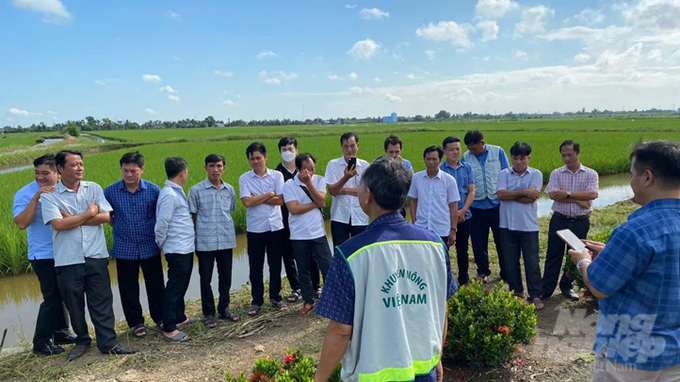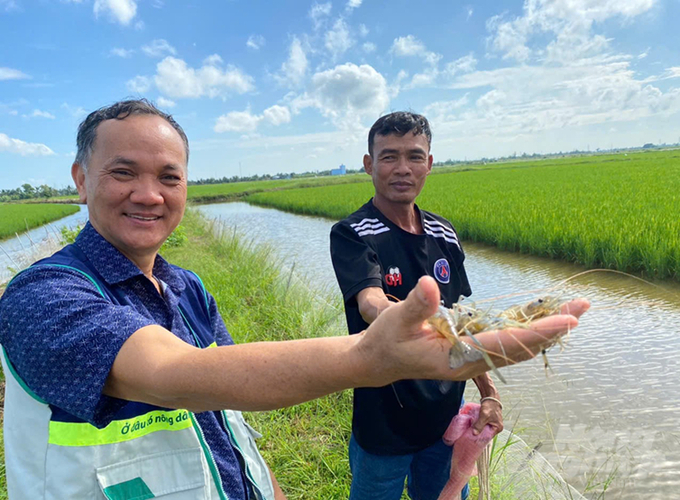November 28, 2025 | 04:19 GMT +7
November 28, 2025 | 04:19 GMT +7
Hotline: 0913.378.918
November 28, 2025 | 04:19 GMT +7
Hotline: 0913.378.918

Farmers attending a training session. Photo: Trong Linh.
The National Agricultural Extension Center, in collaboration with the Ca Mau Agricultural Extension Center, recently organized a training course aimed at enhancing the capacity of local community agricultural extension teams. The course is part of a project titled “Improving the Effectiveness of Agricultural Extension Activities with the Aim of Consolidating the Community Agricultural Extension Model.” The project is scheduled for implementation from 2024 to 2025.
During the training process, participants gained knowledge on agricultural extension organization, operational regulations, and community-based agricultural extension. The course covered skills for providing agricultural extension services, high-quality and low-emission rice cultivation techniques, and solutions for organic, circular, and low-emission farming. Additionally, the training program also emphasized the role of community agricultural extension in implementing Sustainable Development Project for one million hectares of specialized, low-emission high-quality rice in association with green growth in the Mekong Delta region by 2030.
Additionally, participants received training in key skills for community agricultural extension, including production and trading planning, contract negotiation for agricultural cooperatives, digital transformation in agricultural production, and advisory solutions for promoting community agricultural extension in the digital transformation process.

A rice and giant freshwater prawn farming model in Hamlet 5, Tri Luc Commune, Thoi Binh District. Photo: Trong Linh.
During the training process, participants visited a rice and giant freshwater prawn farming model in Hamlet 5, Tri Luc Commune, Thoi Binh District. Subsequently, leaders from Tri Luc Commune and the local community agricultural extension team shared insights on the team’s duties and responsibilities. They also outlined production processes that promote quality standards, food safety, and compliance with market and business demands. Furthermore, local community agricultural extension teams provide consultations and connect farmers with businesses, cooperatives, and collaborative groups to promote digital transformation in agricultural production.
The training course provided participants with a comprehensive understanding of the roles and responsibilities of agricultural extension services and community agricultural extension teams in modern agricultural production. It also highlighted the value of fostering community engagement, developing agricultural tourism, advancing rural development, and supporting the agriculture sector in addressing new challenges.
Translated by Nguyen Hai Long

(VAN) According to Mr. Vo Minh Thanh, Director of the Tay Ninh Department of Agriculture and Environment, Resolution 57 has created a new development pathway for the locality, shifting from traditional toward modern agriculture.
/2025/11/26/4909-2-154329_878.jpg)
(VAN) Pearl grouper farming in HDPE cages not only delivers economic efficiency but also contributes to protecting the environment, creating jobs, and promoting marine-based experiential tourism.

(VAN) The model of making a living under the forest canopy through the agroforestry system in Van Son commune, Bac Ninh province, is expected to generate an annual income of approximately VND 30 million/ha.

(VAN) Many enterprises in Can Tho are harnessing natural energy and reducing greenhouse gas emissions in their production processes, thereby contributing to the promotion of a sustainable green transition.
/2025/11/24/3536-2-112800_176.jpg)
(VAN) Dong Nai now has tens of thousands of hectares of forests certified for sustainable management, and this area will continue to be expanded in the coming period.

(VAN) Vinh Ha hamlet (Dai Xuyen commune, Hanoi) is shifting away from small-scale farming as households adopt bioscurity into their breeder chicken models.

(VAN) Heavy rains make aquatic species more vulnerable to disease. Proactive water management and high-tech systems help farmers prevent outbreaks and protect yields.